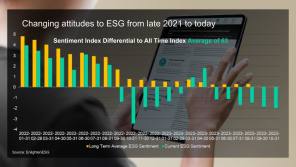
Article 3 / 4
Guide to Responsible InvestingDoes responsible investing come at the cost of returns?

There is a notion that adopting a responsible investment approach will negatively impact financial returns.
But this is a “frustratingly persistent myth”, according to Kate Elliot, head of ethical, sustainable and impact research at Rathbone Greenbank Investments.
“There is now a significant body of research to support the view that taking environmental, social and governance factors into account in investment decisions does not have to result in lower returns. Indeed, several studies suggest the opposite and that a responsible investment approach may help to enhance long-term returns.”
Jamie Govan, senior ESG investment manager at Abrdn, cites a 2019 paper by the Morgan Stanley Institute for Sustainable Investing, which details research conducted on the performance of almost 11,000 mutual funds between 2004 and 2018. The analysis showed there was no financial trade-off in the returns of sustainable funds compared to traditional funds.
Subsequent analysis of more than 3,000 US mutual funds and exchange-traded funds, published by the institute in February, showed that sustainable equity funds outperformed their traditional peer funds by a median total return of 4.3 percentage points in 2020. During the same period, sustainable taxable bond funds also beat their non-ESG counterparts by a median total return of 0.9 percentage points.
Jack Turner, an investment manager at 7IM, raises the concept of portfolio theory being based on the premise that an investor moves further away from their optimal portfolio as they limit their investment universe.
“But the real world is a lot more complicated than that,” he adds. “Would shrinking your universe by avoiding companies that rely on fossil fuels harm returns if they are more heavily regulated in the future? How profitable will tobacco stocks be if people in the emerging markets cut back on smoking? The time horizons of your investment will have a big impact here.”
Performance phases
Referring to the view that investing responsibly leads to underperformance in contrast to ‘agnostic’ strategies as a misconception, Oliver Jones, investment analyst at PortfolioMetrix, says the belief largely stems from the performance of ethical funds throughout the noughties that primarily relied on negative screens to exclude ‘sin sectors’, such as tobacco or arms manufacturers, which performed well over the period.
He adds: “It is our belief that going forward there will be periods when responsible investment strategies outperform agnostic approaches, and periods in which they underperform. This is largely driven by what responsible strategies do and don’t invest in.”
Jones cites the Covid-related sell-off between March and April last year, when oil and gas companies, banks, traditional auto-manufacturers and airlines performed “horribly” due to the impact of the pandemic.
“Responsible investment strategies typically have far less, if any, exposure to these sectors and so were much less impacted by the underperformance of these sectors. Agnostic strategies, and particularly those focused on the more ‘value’ areas of the market, had higher exposures to these sectors, and so felt the full force of the market drawdown.
“In November 2020 we had news of successful vaccine trials, which led to the expectation of economic growth and inflation. This led to those areas that were particularly hard hit during March to April 2020 such as financials, oil and gas companies and airlines outperforming the market, and those sectors that had previously held up well underperforming.
“In terms of fund performance, this led to a reversal of what happened in March, with agnostic strategies and particularly those focused on value outperforming approaches focused on responsible investment. This trend has largely continued in 2021.”
Rob Morgan, chief analyst at Charles Stanley, says “stringent” ethical or sustainability exclusions may at times have a detrimental impact on performance, especially over shorter time periods.
“Any process that drastically reduces the number of available investments, for instance by screening out whole sectors and industries, does reduce the opportunity set, and this might lead to periods of underperformance or outperformance against a standard benchmark due to the portfolio biases it creates.
“For instance, excluding the energy, mining and tobacco sectors from a portfolio on responsible or ethical grounds could reduce diversification. These are important constituents of many indices, the UK’s FTSE 100 being a prime example, and if they perform particularly well or badly over a given period then there are consequences for the relative performance of socially responsible funds that do not hold them.
“Broader forms of responsible investing prioritise engagement over exclusion or divestment, though, which can mean a more diverse and well-rounded portfolio that still aims to raise environmental or social standards across companies and industries.”
But Morgan also says that companies managing ESG risks are more likely to avoid major pitfalls or controversies.
“Those that are improving could boost their value in the eyes of shareholders as they come to be perceived as higher quality,” he adds. “Any investor assessing a business should find that considering these risks is helpful and potentially beneficial to long-term returns.”
Chloe Cheung is a features writer at FTAdviser





